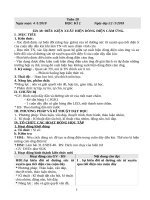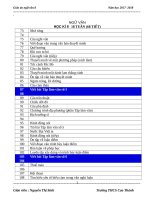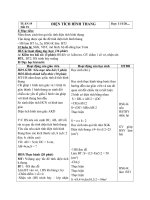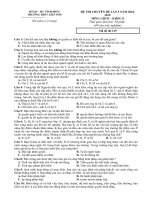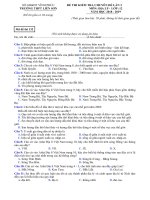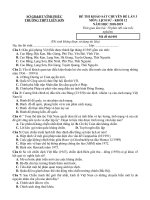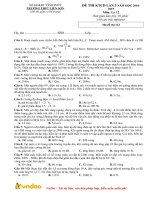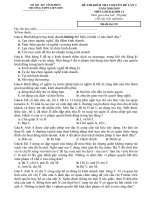Giáo án học kì 2 unit 4 môn tiếng anh lớp 11 năm 2019 trường thpt liễn sơn | Tiếng Anh, Lớp 11 - Ôn Luyện
Bạn đang xem bản rút gọn của tài liệu. Xem và tải ngay bản đầy đủ của tài liệu tại đây (76.69 KB, 9 trang )
<span class='text_page_counter'>(1)</span><div class='page_container' data-page=1>
<b>UNIT 4: CARING FOR THOSE IN NEED</b>
<b>I. Aims:</b>
<i><b>1. Knowledge: By the end of the lesson, Ss should be able to use the simple past and the</b></i>
present perfect and to use the language to communicate.
<i><b>2. Skills: By the end of the lesson, Ss should be able to conduct a survey and prepare an</b></i>
action plan for voluntary work in their neighborhood.
<b>II. Methods: Integrated, Communicative.</b>
<b>III. Teaching aids:</b>
<b>1. Teacher: - Teaching aids: textbook, lesson plan, pictures, cards, charts,…</b>
<b>2. Students: - Textbook, stationary,…</b>
<b>IV. Anticipated problems: The differences between the simple past and the present</b>
perfect
<b>V. Procedure:</b>
<i><b>Ngày so n</b><b>ạ : ……../……/2019 </b></i> <i><b>Ngày gi ng</b><b>ả : ……../……/2019</b></i>
<b>PERIOD 31. GETTING STARTED</b>
<b>I. Objectives: By the end of the lesson, Ss should be able to talk about people with</b>
difficulties and how to support them.
<b>II. Teaching aids:</b>
<b>1. Teacher: - Teaching aids: textbook, lesson plan, pictures, cards, charts,…</b>
<b>2. Students: - Textbook, stationary,…</b>
<b>III. Procedure:</b>
<b>Steps + time</b> <b>Learning Activities</b> <b>Language focus</b> <b>Modes</b>
<b>Warm-up</b>
(5 minutes) <i>* Story-telling: What I/we did.</i>- Ss talk about voluntary work
- In turn to share the experiences or
stories.
<i><b>Vocab: words & phrases</b></i>
related to disabilities.
<i><b>Grammar: Simple Past</b></i>
vs. Present Perfect.
Groups
Pairs
<b>Lead-in</b>
(5 minutes)
Ask Ss listen to look at the pictures
and ask them what they see in the
pictures
Ask Ss to guess the content of the
conversation
<i>Suggested answers:</i>
<i>In the first picture, people are using</i>
<i>sign language which is often used to</i>
<i>communicate with the mute or the</i>
<i>dumb </i>
<i> In the second</i>
<i>picture, we can see</i>
<i>students</i> <i>with</i>
<i>disabilities. They looks</i>
<i>happy and optimistic</i>
<i> In the third picture, </i>
<i>we can see students </i>
<i>preparing gifts. Maybe </i>
<i>they are going to give </i>
<i>these presents to disable </i>
<i>children.</i>
Individually
In pairs
<b>Listen and</b>
<b>read</b>
(5 minutes)
Ask Ss listen to the recording and
read the conversation
Explain new words if necessary
Listen and read the conversation,
take notes new word
What's up? visual/
hearing/ physical
impairments
cognitive impairments
disrespectful
integrate in the
community
Youth Union
Individually
In pairs
<b>Read the</b>
<b>conversatio</b>
<b>n again</b>
(10 minutes)
Ask Ss to do the task, then compare
the result with their partner
Check their answer, ask them to give
evidences for the answer
Further practice
Ask Ss to find out in the conversation
the synonyms to the following words
<i>Suggested answers:</i>
1. T I'm preparing some gift ....
3. NG collect gift for
local charities
4. T I have an
idea .... languages
5. NG I'm
preparing .... ago
1. disabilities
2. cognitive impairment
3. dumb
</div>
<span class='text_page_counter'>(2)</span><div class='page_container' data-page=2>
disabilities
2. F Sure! A few ... us 4. gift5. what's up?
<b>3. How do</b>
<b>you think</b>
<b></b>
<b>non-disabled</b>
<b>people</b>
<b>perceive and</b>
<b>treat people</b>
<b>with</b>
<b>disabilities</b>
(15 minutes)
Ask Ss to work in groups of three or
four to do this task
Suggest some questions:
How do non-disabled people think
about disabled one?
Do you believe that disabled people
can live independently and make
their contributions to the society?
Can you give some examples of
people who overcome their
disabilities to succeed in life?
What should we do to help disabled
people?
<i>Suggested answers:</i>
<i>Non-disabled people often feel sorry</i>
<i>for people with disabilities.</i>
<i>Many people think that disabled</i>
<i>people can do nothing and can't live</i>
<i>independently.</i>
<i>Many people think</i>
<i>disabled people are</i>
<i>burdens to their family</i>
<i>and the society</i>
<i>I think non-disabled</i>
<i>people used to think that</i>
<i>people with disabilities</i>
<i>always need to be looked</i>
<i>after. However, attitudes</i>
<i>have changed. </i>
<i>People with disabilities</i>
<i>are now perceived as</i>
<i>valued members of</i>
<i>society.</i>
<i>Nguyen Ngoc Ky</i>
<i>Nick Vujicic </i>
<i>We can listen to their</i>
<i>problems, give them</i>
<i>encouragements, and</i>
<i>help them to overcome</i>
<i>their difficulty.</i>
Groups
Individually
In pairs
<b>IV. Consolidation (2 mins) - Compound nouns in the conversation</b>
- Talking about what we should do to help people with disabilities
<b>V. Homework: (1 min) </b>- Talking about what we should do to help people with disabilities
SELF-EVALUATION: ………
………
<i><b>Ngày so n</b><b>ạ : ……../……/2019 </b></i> <i><b>Ngày gi ng</b><b>ả : ……../……/2019</b></i>
<b>PERIOD 32. LANGUAGE</b>
<b>I. Objectives: By the end of the lesson, Ss should be able to use the elision of vowel, the</b>
simple past and the present perfect.
<b>II. Teaching aids:</b>
<b>1. Teacher: - Teaching aids: textbook, lesson plan, pictures, cards, charts,…</b>
<b>2. Students: - Textbook, stationary,…</b>
<b>III. Procedure:</b>
<b>Steps + time</b> <b>Learning Activities</b> <b>Language focus</b> <b>Modes</b>
<b>Warm-up</b>
(5 minutes) <i>* Story-telling: What I/we did.</i>- Ss talk about voluntary work
- In turn to share the experiences
or stories.
<i><b>Vocab: words & phrases</b></i>
related to disabilities.
<i><b>Grammar: Simple Past</b></i>
vs. Present Perfect.
Groups
Pairs
VOCABULARY
<b>1. Match each</b>
<b>word with its</b>
<b>meaning</b>
(5 minutes)
Ask Ss to do the tasks and
compare the results with their
partner
Ask Ss to pay attention to the
word "campaign", Here it is a
noun.
<i>Suggested answers:</i>
1. b 2. e 3. d
4. c 5. a
Groups
Pairs
<b>2. Complete the</b>
<b>following</b>
<b>sentences </b>
(5 minutes)
Ask Ss to do the task then
compare the answer with their
partner
<i>Suggested answers:</i>
1. blind 2. cognitive
3. donation 4. physical
5. hearing
Individually
In pairs
PRONUNCIATIO
N
<b>Elision of vowel</b>
Pay attention to the vowel in
bold
Ask Ss to read the yellow box
Play the recording and
let Ss listen. Play it again
with pauses for them to
</div>
<span class='text_page_counter'>(3)</span><div class='page_container' data-page=3>
1. Listen and
repeat. and then report theirunderstanding. repeat each word
2. Listen and
repeat
(5 minutes)
Ask other Ss to give comments
Play the recording and let Ss
listen
Play it again with pauses
for them to repeat each
sentence
Individually
In pairs
GRAMMAR
1. Choose the
correct form of
the verbs
(10 minutes)
Asks Ss to read the yellow box
and review the use and structure
of the past simple and the
present perfect
Ask Ss to do the task then
compare the answer with their
partner
<i>Suggested answers:</i>
1.launched
2. decided
3. invited
4. have completely
changed
5. have collected
2. Complete each
sentences, using
the past simple
or present
perfect
(10 minutes)
Ask Ss to do the task then
compare the answer with their
partner.
<i>Suggested answers:</i>
1.In October, we decided to start
a "Special Christmas Gifts"
campaign
2. About 30 students from other
schools have joined us since last
month.
3. I have volunteered at a special
school twice since I finished
Grade 10.
4. I presented an action plan to
the school principal when I was
at the meeting.
5. So far, people have
donated more than 100
gifts
6. Last month, I talked to
some students about
how to learn English
effectively.
7. They have sent some
textbooks and
dictionaries recently
8. I'm preparing some
Christmas gifts for the
students with
disabilities in the school
we visited two months
ago
<b>IV. Consolidation (3 mins) </b>- Vocabulary related the disabled and how to help them
- The simple past tense and the present perfect tense
<b>V. Homework: (1 min)</b> - Vocabulary & grammar points
- Review the lesson, next period preparation
SELF-EVALUATION: ………
………
<i><b>Ngày so n</b><b>ạ : ……../……/2019 </b></i> <i><b>Ngày gi ng</b><b>ả : ……../……/2019</b></i>
<b>PERIOD 33. READING</b>
<b>I. Objectives: By the end of the lesson, Ss should be able to get some specific information</b>
about helping people with difficulties.
<b>II. Teaching aids:</b>
<b>1. Teacher: - Teaching aids: textbook, lesson plan, pictures, cards, charts,…</b>
<b>2. Students: - Textbook, stationary,…</b>
<b>III. Procedure:</b>
<b>Steps + time</b> <b>Learning Activities</b> <b>Language focus</b> <b>Modes</b>
<b>Warm-up</b>
(5 minutes) <i>* Story-telling: What I/we did.</i>- Ss talk about voluntary work
- In turn to share the experiences
or stories.
<i><b>Vocab: words & phrases</b></i>
related to disabilities.
<i><b>Grammar: Simple Past</b></i>
vs. Present Perfect.
Groups
Pairs
<b>1. Looking at the</b>
<b>symbols.</b>
(5 minutes)
Ask Ss to work in pairs to do this
task
<i>Suggested answers:</i>
1. People with mobility
impairments
2. People with visual
impairments
3. People with hearing
impairments
4. People with speech
impairments
</div>
<span class='text_page_counter'>(4)</span><div class='page_container' data-page=4>
<b>2. Matching</b>
(8 minutes) Use a dictionary if necessary.Ask Ss to do the task then
compare their answer with a
partner
<i>Suggested answers:</i>
1. b 2. d 3. e 4. a 5. c IndividuallyIn pairs
<b>3. Read a school</b>
<b>magazine</b>
<b>report</b>
(8 minutes)
Choose the appropriate heading
for each paragraph.
Let Ss read the text, do the task,
then compare their results.
<i>Suggested answers:</i>
1. b 2. c 3. a IndividuallyIn pairs
<b>4. Complete</b>
<b>these sentences</b>
<b>with no more</b>
<b>than three</b>
<b>words.</b>
Let Ss read the text, do the task,
then compare their results.
<i>Suggested answers:</i>
1. students with disabilities
2. record popular books
<i>Suggested answers:</i>
3. participating fully in
4. record-breaking
5. this Christmas
unforgettable
Individually
In pairs
<b>5. Discuss with a</b>
<b>partner </b>
(10 minutes)
How you can help children with
disabilities in your community.
Ask Ss to work in pairs, do the
task.
<i>Suggested answers:</i>
- play games with them
- listen to their problems
- give them
encouragement
- offer them gifts
- help them with their
study
Individually
In pairs
<b>IV. Consolidation (3 mins) </b>- Vocabulary related to helping people with disabilities
- Reading skills: skimming, scanning, guessing
<b>V. Homework: (1 min)</b> - Vocabulary & grammar points
- Review the lesson, next period preparation
SELF-EVALUATION: ………
………
<i><b>Ngày so n</b><b>ạ : ……../……/2019 </b></i> <i><b>Ngày gi ng</b><b>ả : ……../……/2019</b></i>
<b>PERIOD 34. SPEAKING</b>
<b>I. Objectives: By the end of the lesson, Ss should be able to interview a volunteer and</b>
discuss voluntary work.
<b>II. Teaching aids:</b>
<b>1. Teacher: - Teaching aids: textbook, lesson plan, pictures, cards, charts,…</b>
<b>2. Students: - Textbook, stationary,…</b>
<b>III. Procedure:</b>
<b>Steps + time</b> <b>Learning Activities</b> <b>Language focus</b> <b>Modes</b>
<b>Warm-up</b>
(5 minutes) <i>* Story-telling: What I/we did.</i>- Ss talk about voluntary work
- In turn to share the experiences
or stories.
<i><b>Vocab: words & phrases</b></i>
related to disabilities.
<i><b>Grammar: Simple Past</b></i>
vs. Present Perfect.
Groups
Pairs
<b>1. Read the</b>
<b>following</b>
<b>phrases.</b>
(9 minutes)
Write R if it expresses a reason
and A if it expresses a voluntary
activity
Ask Ss to work by themselves, do
the task then share their answer
with their partner
<i>Suggested answers:</i>
1. R 2. A 3. R
4. R 5. A
Groups
Pairs
<b>2. The principal</b>
<b>of a special</b>
<b>school.</b>
(10 minutes)
Complete the interview
Let Ss work in pairs and do the
task
Let Ss practice the interview
1. volunteer position
2. special school
3. change people's lives
4. in the past
5. improve coordination
6. clearly and effectively
Individually
In pairs
3. Read the
information
about two special
Choose one of them. Work in
pairs and make a similar
interview as in 2
Let Ss practice the
</div>
<span class='text_page_counter'>(5)</span><div class='page_container' data-page=5>
schools in VN. Let Ss work in pairs and do the
task
<b>IV. Consolidation (3 mins) </b>- Vocabulary related to interviewing a volunteer
- Speaking skills: talk about family problems
<b>V. Homework: (1 min)</b> - Vocabulary & grammar points
- Review the lesson, next period preparation
SELF-EVALUATION: ………
………
<i><b>Ngày so n</b><b>ạ : ……../……/2019 </b></i> <i><b>Ngày gi ng</b><b>ả : ……../……/2019</b></i>
PERIOD 35. LISTENING
<b>I. Objectives: By the end of the lesson, Ss should be able to get information then talk about</b>
an outstanding person with disabilitiy.
<b>II. Teaching aids:</b>
<b>1. Teacher: - Teaching aids: textbook, lesson plan, pictures, cards, charts,…</b>
<b>2. Students: - Textbook, stationary,…</b>
<b>III. Procedure:</b>
<b>Steps + time</b> <b>Learning Activities</b> <b>Language focus</b> <b>Modes</b>
<b>Warm-up</b>
(5 minutes) <i>* Story-telling: What I/we did.</i>- Ss talk about voluntary work
- In turn to share the experiences
or stories.
<i><b>Vocab: words & phrases</b></i>
related to disabilities.
<i><b>Grammar: Simple Past</b></i>
vs. Present Perfect.
Groups
Pairs
<b>1. Look at the</b>
<b>picture.</b>
(5 minutes)
Can you recognize the people?
What disabilities do you think
they had.
Ask Ss to work in pairs, discuss
the questions.
<i>Suggested answers:</i>
1. Luis Einstein
2. Chopin
Groups
Pairs
<b>2. Listen to the</b>
<b>radio program</b>
(10 minutes)
Listen to the radio program
about a famous youngster with a
disability and fill in the
information.
Ask Ss to do this task in pairs
<i>Suggested answers:</i>
1. Nguyen Anh
2. Vietnamese
3. Glass-bone 4. Music
5. Outstanding
youngster with disability
Individually
In pairs
<b>3. Listen again</b>
<b>and complete</b>
<b>the sentences</b>
(9 minutes)
Play the tape twice
Let Ss listen to the recording and
work in pairs to do the task
<i>Suggested answers:</i>
1. Get started 2. disease
3. sing songs
4. supporting
5. equally treated
Individually
In pairs
<b>4. Work with a</b>
<b>partner.</b>
(9 minutes)
Ask and answer the following
question.
Ask Ss to work in pairs, ask and
answer the questions.
- give them care, comfort
and support
- encourage them to
succeed in life
Groups
Individually
In pairs
<b>IV. Consolidation (3 mins) </b>- Vocabulary related to caring disabled outstanding people
- Listening skills
<b>V. Homework: (1 min)</b> - Vocabulary & grammar points
- Review the lesson, next period preparation
SELF-EVALUATION: ………
………
<i><b>Ngày so n</b><b>ạ : ……../……/2019 </b></i> <i><b>Ngày gi ng</b><b>ả : ……../……/2019</b></i>
<b>PERIOD 36. TEST CORRECTION II</b>
I. AIMS/OBJECTIVES OF THE LESSON
</div>
<span class='text_page_counter'>(6)</span><div class='page_container' data-page=6>
<b>3. Attitudes: To give Ss the motivation to learn hard for their exam</b>
II. PREPARATION
<b>1. Teacher: - Teaching aids: Lesson plan, answer keys - Teaching method: Communicative </b>
<b>2. Students: Look at their test paper at home</b>
III. PROCEDURE
<b>1. Class organization: (1 minute)</b>
<b>2. Check – up: (omitted) Some Ss go to the board, do some tasks again</b>
<b>3. Testing correction: (40 minutes)</b>
TEACHER’S ACTIVITIES STUDENTS’ ACTIVITIES
<b>- Gives the answer keys</b>
- Explains some knowledge
- Answers Ss’s questions
- Compare the answer keys with their performance
A. Listening: 01. C 02. C 03. A 04. A 05. MONDAY
06. JANUARY 07. 9.15 08. THE STATION
B. 09. B 10. A 11. A 12. D 13. D 14. C 15. D 16. A 17. D 18. B
19. C 20. B 21. B 22. D 23. C 24. C 25. A 26. C 27. B 28. C
29. C 30. B 31. A 32. A
<i>C. 33. → I’ve never visited Brazil before.</i>
<i> 34. → It is not likely that they will succeed.</i>
<i> 35. → The longer I waited, the angrier I got.</i>
<i> 36. → She had her car repaired yesterday.</i>
- Revise some knowledge
- Ask questions
IV. SELF-EVALUATION: ………
………
<i><b>Ngày so n</b><b>ạ : ……../……/2019 </b></i> <i><b>Ngày gi ng</b><b>ả : ……../……/2019</b></i>
PERIOD 37. WRITING
<b>I. Objectives: By the end of the lesson, Ss should be able to write an article about problems</b>
facing disabled people and how they can be solved.
<b>II. Teaching aids:</b>
<b>1. Teacher: - Teaching aids: textbook, lesson plan, pictures, cards, charts,…</b>
<b>2. Students: - Textbook, stationary,…</b>
<b>III. Procedure:</b>
<b>Steps + time</b> <b>Learning Activities</b> <b>Language focus</b> <b>Modes</b>
<b>Warm-up</b>
(5 minutes)
<i>* Story-telling: What I/we did.</i>
- Ss talk about voluntary work
- In turn to share the experiences
or stories.
<i><b>Vocab: words & phrases</b></i>
related to disabilities.
<i><b>Grammar: Simple Past</b></i>
vs. Present Perfect.
Groups
Pairs
<b>1. Read the a</b>
<b>student's article</b>
(7 minutes)
Read the a student's article
about a problem facing children
with cognitive impairments.
Ask Ss to work in pairs and do
the task.
<i>Suggested answers:</i>
1. c
2. b
3. a
Groups
Pairs
<b>2. Read the</b>
<b>article again</b>
(7 minutes)
Read the article again and
complete the outline.
Ask Ss to work in pairs and do
the task.
<i>Suggested answers:</i>
Introduction
Main body
Conclusion
Groups
Individually
In pairs
<b>3. Choose one of</b>
<b>the following</b>
<b>problems and</b>
<b>write an article</b>
<b>of 160 - 180</b>
<b>words using the</b>
<b>outline</b>
(15 minutes)
Ask Ss to do the task
<i> Nowadays, we all find the fact that many students with</i>
<i>visual impairments have to struggle in regular schools whose</i>
<i>activities they cannot fully participate in and often are left</i>
<i>behind. What are the solutions to this problem?</i>
<i> First of all, the government should set up more special</i>
<i>schools for people with visual impairments where they have</i>
<i>the best facilities and conditions to learn and study. In these</i>
<i>schools, disabled people can receive enough care and support,</i>
</div>
<span class='text_page_counter'>(7)</span><div class='page_container' data-page=7>
<i>they won't have to face up with discrimination from </i>
<i>non-disabled students. All the facilities are furnished for them, so</i>
<i>they won't have any difficulty in achieving the knowledge.</i>
<i> Secondly, in the event of mixed education, people with</i>
<i>visual impairments should also be specially taken care of.</i>
<i>They need to be provided with large-scale or Braille books,</i>
<i>talking computers or materials with large print. Besides, we</i>
<i>should encourage them to become part of study group; create</i>
<i>atmosphere of friendliness, respect and acceptance during all</i>
<i>activities.</i>
<b>IV. Consolidation (3 mins) - Vocabulary related to </b>posing a problem and solutions
- Writing skills: write a a problem and solutions
<b>V. Homework: (1 min)</b> - Vocabulary & grammar points
- Review the lesson, next period preparation
SELF-EVALUATION: ………
………
<i><b>Ngày so n</b><b>ạ : ……../……/2019 </b></i> <i><b>Ngày gi ng</b><b>ả : ……../……/2019</b></i>
PERIOD 38. COMMUNICATION AND CULTURE
<b>I. Objectives: By the end of the lesson, Ss should be able to talk about the voluntary work</b>
and the International Day of Person with Disability.
<b>II. Teaching aids:</b>
<b>1. Teacher: - Teaching aids: textbook, lesson plan, pictures, cards, charts,…</b>
<b>2. Students: - Textbook, stationary,…</b>
<b>III. Procedure:</b>
<b>Steps + time</b> <b>Learning Activities</b> <b>Language focus</b> <b>Modes</b>
<b>Warm-up</b>
(5 minutes) <i>* Story-telling: What I/we did.</i>- Ss talk about voluntary work
- In turn to share the experiences
or stories.
<i><b>Vocab: words & phrases</b></i>
related to disabilities.
<i><b>Grammar: Simple Past</b></i>
vs. Present Perfect.
Groups
Pairs
<b>Communication</b>
<b>East meets West</b>
(15 minutes)
a. Listen to an introduction to a
charitable organization
Ask Ss to do the task
1. 1994 2. non-government
3. to children in poor countries
4. to develop their agriculture
5. invest money
b. Work in groups, your class
wants to get involved in East
Meets West's work
Asks Ss to work in groups to do
the task
Aims: to help
disadvantaged children
Funding: fund-raising
performances
Volunteers: Students
from grade 10 and 11
Cooperation: With
Student's Parents
Society
Message: Happiness
rises double; Sadness
divides half
Events: fund-raising
performances, volunteer
work
Groups
Pairs
<b>Culture</b>
International day
of persons with
disabilities
1. Look at the logos.
- Ask Ss to do the task
2. Ask Ss to work in pairs and do
the task
What do you think they
present?
Read the text and check
your guesses
Groups
Individually
In pairs
3. Read the text
again and answer
the questions
(18 minutes)
Let Ss to work in pairs and do the task:
1. The United Nations did
2. Its aim is to further raise awareness of disability issues
and to call for world-wide support for the rights and
well-being of disabled people
3. Challenges, discrimination, poverty and limited access to
</div>
<span class='text_page_counter'>(8)</span><div class='page_container' data-page=8>
education, employment and health care
4. For a civilized society where disabled people enjoy their
lives
<b>IV. Consolidation (3 mins) - Vocabulary & grammar points</b>
- Talk about International day for persons with disabilities
<b>V. Homework: (1 min)</b> - Vocabulary & grammar points
- Review the lesson, next period preparation
SELF-EVALUATION: ………
………
<i><b>Ngày so n</b><b>ạ : ……../ ……/2019 </b></i> <i><b>Ngày gi ng</b><b>ả : ……../ …../2019</b></i>
PERIOD 39. LOOKING BACK & PROJECT
<b>I. Objectives: By the end of the lesson, Ss should be able to to conduct a survey and</b>
prepare an action plan for voluntary work in their neighborhood.
<b>II. Teaching aids:</b>
<b>1. Teacher: - Teaching aids: textbook, lesson plan, pictures, cards, charts,…</b>
<b>2. Students: - Textbook, stationary,…</b>
<b>III. Procedure:</b>
<b>Steps + time</b> <b>Learning Activities</b> <b>Language focus</b> <b>Modes</b>
<b>Warm-up</b>
(5 minutes) <i>* Story-telling: What I/we did.</i>- Ss talk about voluntary work
- In turn to share the experiences
or stories.
<i><b>Vocab: words & phrases</b></i>
related to disabilities.
<i><b>Grammar: Simple Past</b></i>
vs. Present Perfect.
Groups
Pairs
LOOKING BACK
<b>Pronunciation</b>
(5 minutes)
1. Listen and underline thee
syllable with vowel elision. 1. dictionary 2. police3. library 4. deafening
5. history
Groups
Pairs
2. Listen and tick the sentences
that are read with elision of
weak vowel.
1. v 2. 3. 4. v
5. 6. v GroupsIndividually
In pairs
<b>Vocabulary</b>
(10 minutes) Complete the sentences usingthe correct form of the words in
brackets
Let Ss do this vocabulary
exercise in pairs
1. impairments
2. non-disabled
3. integration
4. disrespectful
5. involved 6. donations
Groups
Individually
In pairs
<b>Grammar</b>
(15 minutes) a. Complete the sentences usingthe correct form of the verbs in
the brackets
<i>Exercise 1.</i>
1. came
2. have agreed/ have signed
3. came 4. have started
5. had
b. Complete the sentences with
the verbs in the box
<i>Exercise 2.</i>
1. has never volunteered
2. invented
3. has recorded/ visited
4. has supported
5. have ... worked/
organized/ coached
Groups
Individually
In pairs
PROJECT
(5 minutes) Ask Ss to work in groups, so theycan share the workload.
<i>Suggested cues: </i>
Find someone :
1. how many students in your
class have taken part in
voluntary work
2 What their reasons to
volunteer were
3. What they did
4. What they would like
to do in the future
Prepare an action plan
for volunteer work in
your neighborhood
Groups
Individually
In pairs
<b>IV. Consolidation (3 mins) </b>- The past simple vs the present perfect
</div>
<span class='text_page_counter'>(9)</span><div class='page_container' data-page=9>
- Review the lesson, next period preparation
SELF-EVALUATION: ………
</div>
<!--links-->


